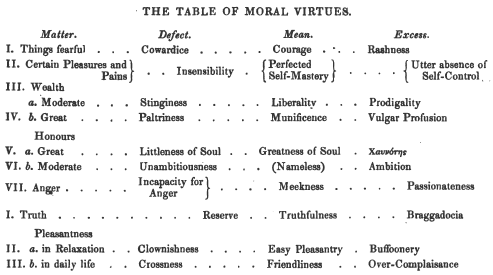
Some of Aristotle’s virtues, with associated vices of deficiency and excess, from D.P. Chase’s 1861 translation (via The Picket Line)
In his lecture last week for CC102 on Aristotle’s concept of virtue, Prof. David Bronstein made a fascinating point about Aristotle’s understanding of the relationship between virtue and pleasure. Prof. Bronstein explains:
Does it feel good to be virtuous? Hear what Aristotle has to say:
We may even go so far as to state that the man who does not enjoy performing noble actions is not a good man at all. Nobody would call a man just who does not enjoy acting justly, nor generous who does not enjoy generous actions, and so on. If this is true, actions performed in conformity with virtue are in themselves pleasant (Nicomachean Ethics, I.8, 1099a, trans. Ostwald).
Do you think Aristotle is right? Some people say that if you enjoy doing virtuous deeds, you are doing them for the wrong reason. If you help an old lady cross the street because it gives you pleasure, not because it is the right thing to do, is that action still virtuous? How important is the intention that motivates the action? Is it possible that actions have more than one motive–wanting to do what’s right and also to gain pleasure? As always, Aristotle gives us lots to think about.
What do you think?
